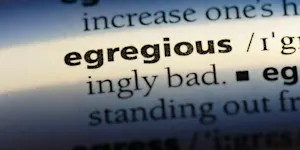What Makes This Word Tick
"Repugnant" has a way of rolling off the tongue with a certain drama. It conjures strong feelings, often of disgust or intense dislike. This isn't the kind of adjective you use lightly—it's for those moments when something truly offends the senses or dignity.
If Repugnant Were a Person…
Imagine a fiercely opinionated art critic who dismisses a painting with a single, withering glance. This person has high standards and isn't afraid to call things as they see them. They're articulate, possibly a bit haughty, and unlikely to mince words when something doesn't meet their approval.
How This Word Has Changed Over Time
Originally, "repugnant" had a more general meaning related to opposition or resistance. Over time, it evolved to describe not just any opposition, but a visceral kind of aversion. Today, it captures an emotional recoil, hinting at moral indignation or revulsion.
Old Sayings and Proverbs That Use Repugnant
While "repugnant" itself doesn't star in any well-known old sayings, the sentiment can be found in classic expressions like "one man's meat is another man's poison." It's a reminder that what one finds repugnant, another might find delightful.
Surprising Facts About Repugnant
Did you know that the word shares roots with "pugnacious"? Both words derive from the Latin "pugnare," which means "to fight." It makes sense—what's repugnant often provokes a metaphorical sparring match with our senses or values.
Out and About With This Word
Whether it's a piece of art, a dish full of anchovies, or a particularly unfashionable pair of trousers, "repugnant" gets around. It's the perfect go-to when something strikes you as so awful, it deserves a label that's just as intense.
Pop Culture Moments Where Repugnant Was Used
In cinema, the character of Ebenezer Scrooge in "A Christmas Carol" often finds joy in branding things as repugnant—his distaste for Christmas is legendary. Meanwhile, in TV shows like "Seinfeld," various characters have been known to pull out this strong adjective to describe a particularly unpalatable soup or contentious social faux pas.
The Word in Literature
"Repugnant" makes its appearances in literary works where characters need a sharp word for a sharp feeling. It's at home in Victorian novels, Gothic mysteries, and even dystopian fiction, where characters frequently confront moral or sensory outrages.
Moments in History with Repugnant
Think of the classic image of the Boston Tea Party—colonists raging against the taxes imposed by Britain. The sentiments of that era had echoes of "repugnance" for what they felt was unfair and insulting treatment, driving them to dramatic acts.
This Word Around the World
In other languages, "repugnant" might translate to terms that emphasize disgust, such as "répugnant" in French or "repugnante" in Spanish. Interestingly, cultures may have unique gestures or ways of expressing similar feelings of intense dislike.
Where Does It Come From?
Tracing "repugnant" takes us back to the Latin "repugnantem," meaning "opposing" or "resisting." As English evolved, the word solidified its niche in the realm of describing something that causes offense or revulsion.
How People Misuse This Word
Sometimes, people use "repugnant" to describe something mildly unpleasant or annoying, overlooking its stronger connotation of something truly detestable or morally offensive.
Words It’s Often Confused With
Repulsive: Both imply aversion, but "repulsive" leans more towards something causing physical aversion, while "repugnant" often includes a moral dimension.
Revolting: Again, a physical dimension is stronger with "revolting," whereas "repugnant" implies a deeper offense.
Appalling: While also strong, "appalling" is more about shock or horror, not necessarily moral or sensory disdain.
Additional Synonyms and Antonyms
Synonyms: Disgusting, abhorrent, offensive
Antonyms: Attractive, agreeable, pleasant
Want to Try It Out in a Sentence?
"Despite the beautiful surroundings, her repugnant remarks soured the entire dinner party."
















